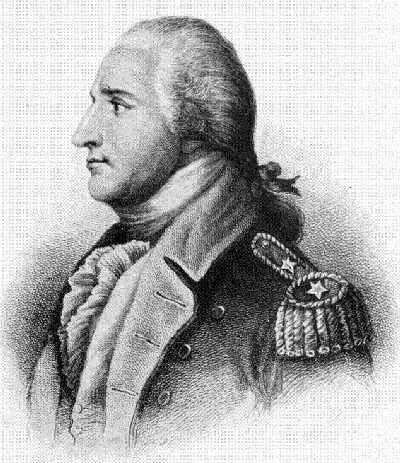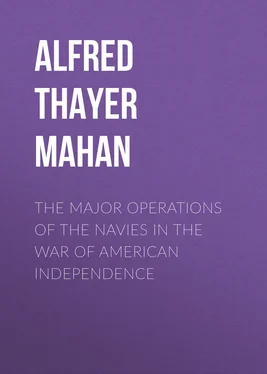Alfred Thayer Mahan - The Major Operations of the Navies in the War of American Independence
Здесь есть возможность читать онлайн «Alfred Thayer Mahan - The Major Operations of the Navies in the War of American Independence» — ознакомительный отрывок электронной книги совершенно бесплатно, а после прочтения отрывка купить полную версию. В некоторых случаях можно слушать аудио, скачать через торрент в формате fb2 и присутствует краткое содержание. Жанр: foreign_prose, История, foreign_edu, foreign_antique, на английском языке. Описание произведения, (предисловие) а так же отзывы посетителей доступны на портале библиотеки ЛибКат.
- Название:The Major Operations of the Navies in the War of American Independence
- Автор:
- Жанр:
- Год:неизвестен
- ISBN:нет данных
- Рейтинг книги:3 / 5. Голосов: 1
-
Избранное:Добавить в избранное
- Отзывы:
-
Ваша оценка:
- 60
- 1
- 2
- 3
- 4
- 5
The Major Operations of the Navies in the War of American Independence: краткое содержание, описание и аннотация
Предлагаем к чтению аннотацию, описание, краткое содержание или предисловие (зависит от того, что написал сам автор книги «The Major Operations of the Navies in the War of American Independence»). Если вы не нашли необходимую информацию о книге — напишите в комментариях, мы постараемся отыскать её.
The Major Operations of the Navies in the War of American Independence — читать онлайн ознакомительный отрывок
Ниже представлен текст книги, разбитый по страницам. Система сохранения места последней прочитанной страницы, позволяет с удобством читать онлайн бесплатно книгу «The Major Operations of the Navies in the War of American Independence», без необходимости каждый раз заново искать на чём Вы остановились. Поставьте закладку, и сможете в любой момент перейти на страницу, на которой закончили чтение.
Интервал:
Закладка:

Benedict Arnold
In conduct and courage, Arnold's behavior was excellent throughout. Without enlarging upon the energy which created the flotilla, and the breadth of view which suggested preparations that he could not enforce, admiration is due to his recognition of the fact—implicit in deed, if unexpressed in word—that the one use of the Navy was to contest the control of the water; to impose delay, even if it could not secure ultimate victory. No words could say more clearly than do his actions that, under the existing conditions, the navy was useless, except as it contributed to that end; valueless, if buried in port. Upon this rests the merit of his bold advance into the lower narrows; upon this his choice of the strong defensive position of Valcour; upon this his refusal to retreat, as urged by Waterbury, when the full force of the enemy was disclosed,—a decision justified, or rather, illustrated, by the advantages which the accidents of the day threw into his hands. His personal gallantry was conspicuous there as at all times of his life. "His countrymen," said a generous enemy of that day, "chiefly gloried in the dangerous attention which he paid to a nice point of honour, in keeping his flag flying, and not quitting his galley till she was in flames, lest the enemy should have boarded, and struck it." It is not the least of the injuries done to his nation in after years, that he should have silenced this boast and effaced this glorious record by so black an infamy.
With the destruction of the flotilla ends the naval story of the Lakes during the War of the American Revolution. Satisfied that it was too late to proceed against Ticonderoga that year, Carleton withdrew to St. John's and went into winter-quarters. The following year the enterprise was resumed under General Burgoyne; but Sir William Howe, instead of coöperating by an advance up the Hudson, which was the plan of 1776, carried his army to Chesapeake Bay, to act thence against Philadelphia. Burgoyne took Ticonderoga and forced his way as far as Saratoga, sixty miles from Ticonderoga and thirty from Albany, where Howe should have met him. There he was brought to a stand by the army which the Americans had collected, found himself unable to advance or to retreat, and was forced to lay down his arms on October 17th, 1777. The garrison left by him at Ticonderoga and Crown Point retired to Canada, and the posts were re-occupied by the Americans. No further contest took place on the Lake, though the British vessels remained in control of it, and showed themselves from time to time up to 1781. With the outbreak of war between Great Britain and France, in 1778, the scene of maritime interest shifted to salt water, and there remained till the end.
CHAPTER II
NAVAL ACTION AT BOSTON, CHARLESTON, NEW YORK, AND NARRAGANSETT BAY—ASSOCIATED LAND OPERATIONS UP TO THE BATTLE OF TRENTON
1776
The opening conflict between Great Britain and her North American Colonies teaches clearly the necessity, too rarely recognised in practice, that when a State has decided to use force, the force provided should be adequate from the first. This applies with equal weight to national policies when it is the intention of the nation to maintain them at all costs. The Monroe Doctrine for instance is such a policy; but unless constant adequate preparation is maintained also, the policy itself is but a vain form of words. It is in preparation beforehand, chiefly if not uniformly, that the United States has failed. It is better to be much too strong than a little too weak. Seeing the evident temper of the Massachusetts Colonists, force would be needed to execute the Boston Port Bill and its companion measures of 1774; for the Port Bill especially, naval force. The supplies for 1775 granted only 18,000 seamen,—2000 less than for the previous year. For 1776, 28,000 seamen were voted, and the total appropriations rose from £5,556,000 to £10,154,000; but it was then too late. Boston was evacuated by the British army, 8000 strong on the 17th of March, 1776; but already, for more than half a year, the spreading spirit of revolt in the thirteen Colonies had been encouraged by the sight of the British army cooped up in the town, suffering from want of necessaries, while the colonial army blockading it was able to maintain its position, because ships laden with stores for the one were captured, and the cargoes diverted to the use of the other. To secure free and ample communications for one's self, and to interrupt those of the opponent, are among the first requirements of war. To carry out the measures of the British government a naval force was needed, which not only should protect the approach of its own transports to Boston Bay, but should prevent access to all coast ports whence supplies could be carried to the blockading army. So far from this, the squadron was not equal, in either number or quality, to the work to be done about Boston; and it was not until October, 1775, that the Admiral was authorized to capture colonial merchant vessels, which therefore went and came unmolested, outside of Boston, carrying often provisions which found their way to Washington's army.
After evacuating Boston, General Howe retired to Halifax, there to await the coming of reinforcements, both military and naval, and of his brother, Vice-Admiral Lord Howe, appointed to command the North American Station. General Howe was commander-in-chief of the forces throughout the territory extending from Nova Scotia to West Florida; from Halifax to Pensacola. The first operation of the campaign was to be the reduction of New York.
The British government, however, had several objects in view, and permitted itself to be distracted from the single-minded prosecution of one great undertaking to other subsidiary operations, not always concentric. Whether the control of the line of the Hudson and Lake Champlain ought to have been sought through operations beginning at both ends, is open to argument; the facts that the Americans were back in Crown Point in the beginning of July, 1776, and that Carleton's 13,000 men got no farther than St. John's that year, suggest that the greater part of the latter force would have been better employed in New York and New Jersey than about Champlain. However that may be, the diversion to the Carolinas of a third body, respectable in point of numbers, is scarcely to be defended on military grounds. The government was induced to it by the expectation of local support from royalists. That there were many of these in both Carolinas is certain; but while military operations must take account of political conditions, the latter should not be allowed to overbalance elementary principles of the military art. It is said that General Howe disapproved of this ex-centric movement.
The force destined for the Southern coasts assembled at Cork towards the end of 1775, and sailed thence in January, 1776. The troops were commanded by Lord Cornwallis, the squadron by Nelson's early patron, Commodore Sir Peter Parker, whose broad pennant was hoisted on board the Bristol , 50. After a boisterous passage, the expedition arrived in May off Cape Fear in North Carolina, where it was joined by two thousand men under Sir Henry Clinton, Cornwallis's senior, whom Howe by the government's orders had detached to the southward in January. Upon Clinton's appearance, the royalists in North Carolina had risen, headed by the husband of Flora Macdonald, whose name thirty years before had been associated romantically with the escape of the young Pretender from Scotland. She had afterwards emigrated to America. The rising, however, had been put down, and Clinton had not thought it expedient to try a serious invasion, in face of the large force assembled to resist him. Upon Parker's coming, it was decided to make an attempt upon Charleston, South Carolina. The fleet therefore sailed from Cape Fear on the 1st of June, and on the 4th anchored off Charleston Bar.
Читать дальшеИнтервал:
Закладка:
Похожие книги на «The Major Operations of the Navies in the War of American Independence»
Представляем Вашему вниманию похожие книги на «The Major Operations of the Navies in the War of American Independence» списком для выбора. Мы отобрали схожую по названию и смыслу литературу в надежде предоставить читателям больше вариантов отыскать новые, интересные, ещё непрочитанные произведения.
Обсуждение, отзывы о книге «The Major Operations of the Navies in the War of American Independence» и просто собственные мнения читателей. Оставьте ваши комментарии, напишите, что Вы думаете о произведении, его смысле или главных героях. Укажите что конкретно понравилось, а что нет, и почему Вы так считаете.












